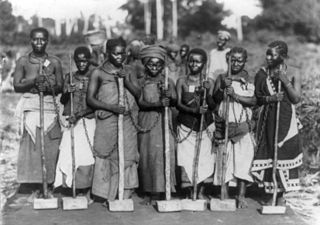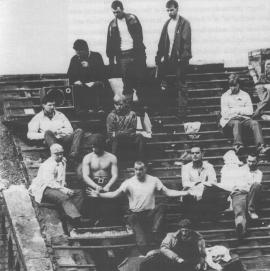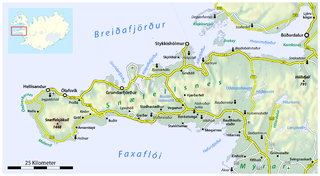A sheriff is a government official, with varying duties, existing in some countries with historical ties to England, where the office originated. There is an analogous although independently developed office in Iceland that is commonly translated to English as sheriff, and this is discussed below.

The penal colony of Cayenne, commonly known as Devil's Island, was a French penal colony that operated in the 19th and 20th century in the Salvation's Islands of French Guiana. Opened in 1852, the Devil's Island system received convicts deported from all parts of the Second French Empire, and was infamous for its harsh treatment of detainees, with a death rate of 75% at their worst, until it was closed down in 1953. Devil's Island was notorious for being used for the internal exile of French political prisoners, with the most famous being Captain Alfred Dreyfus.
Parole is a permanent release of a prisoner who agrees to certain conditions before the completion of the maximum sentence period, originating from the French parole. The term became associated during the Middle Ages with the release of prisoners who gave their word.

Incarceration in the United States is one of the main forms of punishment and rehabilitation for the commission of felony and other offenses. The United States has the largest prison population in the world, and the highest per-capita incarceration rate. In 2016 in the US, there were 655 people incarcerated per 100,000 population. This is the US incarceration rate for adults or people tried as adults. In 2016, 2.2 million Americans have been incarcerated, which means for every 100,000 there are 655 that are currently inmates. This costs the United States government $80 billion dollars a year.

Landsberg Prison is a penal facility located in the town of Landsberg am Lech in the southwest of the German state of Bavaria, about 65 kilometres (40 mi) west of Munich and 35 kilometres (22 mi) south of Augsburg. It is best known as the prison where Adolf Hitler was held in 1924, after the failed Beer Hall Putsch in Munich, and where he dictated his memoirs Mein Kampf to Rudolf Hess.

The Federal Bureau of Prisons (BOP) is a United States agency, under the Department of Justice that is responsible for the custody, control, and care of individuals incarcerated in the federal prison system of the United States. It is also responsible for carrying out all judicially ordered federal civilian executions. US federal prisons hold 183,000 inmates, as of 2018. They have been officially declared overcrowded, with clear implications for safety and security.
A military prison is a prison operated by the military. Military prisons are used variously to house prisoners of war, unlawful combatants, those whose freedom is deemed a national security risk by the military or national authorities, and members of the military found guilty of a serious crime. Thus, military prisons are of two types: penal, for punishing and attempting to reform members of the military who have committed an offense, and confinement-oriented, where captured enemy combatants are confined for military reasons until hostilities cease.

Penal labour is a generic term for various kinds of unfree labour which prisoners are required to perform, typically manual labour. The work may be light or hard, depending on the context. Forms of sentence involving penal labour have included involuntary servitude, penal servitude and imprisonment with hard labour. The term may refer to several related scenarios: labour as a form of punishment, the prison system used as a means to secure labour, and labour as providing occupation for convicts. These scenarios can be applied to those imprisoned for political, religious, war, or other reasons as well as to criminal convicts.
In England and Wales, life imprisonment is a sentence which lasts until the death of the prisoner, although in most cases the prisoner will be eligible for parole after a fixed period set by the judge. This period is known as the "minimum term". In some exceptionally grave cases, however, a judge may order that a life sentence should mean life by making a "whole life order."
The Israeli Military Prison is a prison for guarding soldiers who committed crimes during their service. It is estimated that 15,000-18,000 Israeli soldiers go through an Israeli military prison or detention center every year.
In prison systems, work release programs allow a prisoner who is sufficiently trusted or can be sufficiently monitored to leave confinement to continue working at their current place of employment, returning to prison when their shift is complete. The concept was introduced in Wisconsin in 1913 under a law written by state senator Henry Huber. The program is often referred to locally as the "Huber Law" program.

A prison uniform is the unified outward appearance of detainees in a situation of imprisonment. It is typically adapted under constraint.
Prisoner security categories in the United Kingdom are one of four classifications assigned to every adult prisoner for the purposes of assigning them to a prison. The categories are based upon the severity of the crime and the risk posed should the person escape.

Hard labor still was the most common form of punishment in China in the 1980s. The penal system stressed reform rather than retribution, and it was expected that productive labor would reduce the penal institutions' cost to society. Even death sentences could be stayed by two-year reprieve. If a prisoner was judged to have reformed during that period, his or her sentence could be commuted to life or a fixed term at labor. The Prison Law of the People's Republic of China was enacted December 20, 1994. Since then the Chinese prison system has operated under supervision of the Bureau of Prison Administration which falls under the Ministry of Justice. All these divisions of government are controlled by the Chinese Communist Party. The head of the prison administration is Liu Zhenyu, his official title is Director-General. The prisons in the provinces are then further managed by local offices of justice. The Ministry of Justice states that it holds prisoners in over 700 establishments across the country. There are also thirty extra penitentiaries for juveniles. The corrections system in China has an official population of 1,649,804 inmates (mid-2015), including pre-trial detainees. The prison population rate is 118 per 100,000 people. Female offenders make up 6.5% of the total prison population and 0.4% of prisoners in China are of foreign nationality. In general, the prison population rate is going down in China. In 2008, the prison population rate in China peaked with a rate of 121. There was a plateau created in 2010 as the prison population rate remained the same. Some issues against human rights that prisoners experience are, “…executions without due process, illegal detentions at unofficial holding facilities known as “black jails,” torture and coerced confessions of prisoners…”. There is a laundry list of issues presented on the U.S State Department’s Humanities report for 2016. These include but are not limited to failure to protect refugees, extrajudicial disappearances of citizens, and discrimination against women and minorities.

The 1990 Strangeways Prison riot was a 25-day prison riot and rooftop protest at Strangeways Prison in Manchester, England. The riot began on 1 April 1990 when prisoners took control of the prison chapel, and the riot quickly spread throughout most of the prison. The riot and rooftop protest ended on 25 April when the final five prisoners were removed from the rooftop, making it the longest prison riot in British penal history. One prisoner was killed during the riot, and 147 prison officers and 47 prisoners were injured. Much of the prison was damaged or destroyed with the cost of repairs coming to £50 million.

The Parole Board for England and Wales was established in 1968 under the Criminal Justice Act 1967. It became an independent executive non-departmental public body (NDPB) on 1 July 1996 under the Criminal Justice and Public Order Act 1994. The Parole Board is governed by the Parole Board Rules 2016 made by Parliament under the Criminal Justice Act 2003. Parole Board members are appointed by the Secretary of State for Justice, but are required to take judicial decisions independent of Government. The Parole Board's role is to make risk assessments about prisoners and to make a binding direction to Government about whether prisoners are released into the community on parole. The Parole Board must also give advice to Government when asked, most often about whether offenders are ready to be moved to open prisons from the closed prison estate.
Death row is a special section of a prison that houses inmates awaiting execution after being convicted of a capital crime. The term is also used figuratively to describe the state of awaiting execution, even in places where no special facility or separate unit for condemned inmates exists. In the United States, after a person is found guilty of a capital offense in death penalty states, the judge will give the jury the option of imposing a death sentence or life imprisonment without the possibility of parole. It is then up to a jury to decide whether to give the death sentence; this usually has to be a unanimous decision. If the jury agrees on death, the defendant will remain on death row during appeal and habeas corpus procedures, which may continue for several years.
Iceland is generally considered to be one of the leading countries in the world in regard to the human rights enjoyed by its citizens. Human rights are guaranteed by Sections VI and VII of Iceland's Constitution. Since 1989, a post of Ombudsman exists. Elections are free and fair, security forces report to civilian authorities, there is no state violence, and human-rights groups are allowed to operate without restriction. Religious freedom is guaranteed, and discrimination based on race, gender, disability, language, or other factors is illegal.

The Icelandic Prison Service is the national correctional agency of the Republic of Iceland. Along with the Icelandic National Police, Directorate of Customs, and the Icelandic Coast Guard, the Icelandic Prison Service is one of the few law-enforcement agencies in Iceland. The current director of the Prison Service is Páll Egill Winkel.















